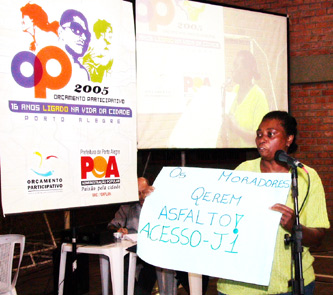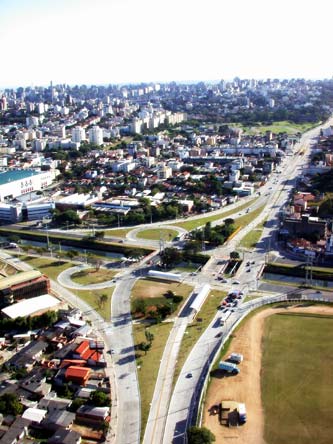Participatory Budgeting
Participatory Budgeting in practice
Participatory budgeting is a form of public administration in which the government presents proposals, provides information, technical advice and infrastructure in the various deliberative meetings, in which it has no voting rights. Two municipal departments are directly involved in participatory budgeting: the Planning Office (Gaplan) and the Community Relations Office (GRC).
Participatory budgeting is a democratic process that gives the population a chance to decide how municipal resources are allocated. 
GAPLAN
The Planning Office is responsible for formulating budget proposals, the Budget Directives Law (LDO), the Four-year Plan, and the Investment and Services Plan, based on community demands and proposals made by municipal offices. It is responsible for coordinating the municipal budget.
GRC
The Community Relations Office is responsible for formulating municipal policies on community relations. It coordinates the political and organisational processes of participatory budgeting for the population. It also coordinates municipal administrative decentralisation and the eight Regional Administrative Centres (CARs) that were created for this purpose.
ADMINISTRATIVE DECENTRALISATION
The processes of administrative and political decentralisation began in 1989, when the popular administration took over. To bring public services closer to the population, eight CARs were set up to attend to the needs of the 16 participatory budgets regions.
There are four basic stages to participatory budgeting:
- Preparatory meetings are held in regions, micro-regions (subdivisions created to broaden and democratise community discussion on regional needs) and in the six thematic participatory budget forums. Participants set the agenda for a single round of regional and thematic plenary assemblies.
- Regional and thematic assemblies take place in pre-established dates set by the Participatory Budgeting Council. The assemblies attended by the mayor and are used to determine the number of delegates, elect new councillors and decide on the thematic priorities of the city.
- Municipal Assembly, in which regional and thematic delegate forums give the mayor a prioritised list of the works and services that the people want the administration to carry out the following year. It is also a time for new councillors to meet and discuss general urban issues.
- Deliberation of the Investment and Services Plan. Discussions take place between October and December. The municipal administration presents the regional and thematic forums with a technical and financial analysis of the demands made by the population, which were delivered to the mayor in the municipal assembly. After presenting, discussing and analysing the demands, the delegate forums approve an Investment and Services Plan Proposal, based on criteria defined by the Participatory Budget Council.
REGIONAL AND THEMATIC FORUMS
To facilitate participatory budget operations and dynamics, the city is divided into 16 regions and six thematic areas. The thematic forums define directives and needs for the whole city in the themes of: 1) Culture; 2) Transportation and circulation; 3) Health and Social Assistance; 4) Economic development and taxation; 5) City organisation, and Urban and Environmental Development; 6) Education, Sport and Leisure.

PARTICIPATION VIA INTERNET
To broaden involvement in shaping and developing the city, the Mayor’s Office set up a website at www.portoalegre.rs.gov.br/op to enable the population to send participatory budgeting suggestions (after registering) for public works and services in a region or thematic area, or both. The suggestions are examined in delegate forums between May and July. Citizens making suggestions receive an email informing them of the dates of meetings and inviting them to take part.
Participation via the Internet is facilitated by a step-by-step approach that guides surfers through registration, and allows them to choose a region or sector, send suggestions, and follow up progress. Should the need arise, they are then contacted by email by technical experts in participatory budgeting.
The Internet can also be used to follow progress in the implementation of public works and services prioritised by the population the previous year. It also provides information on demands, regions or offices. Information on public works or services is available from the beginning of the process to the end of the project.
PARTICIPATORY BUDGET CYCLE 2004
March and April – Preparatory Meetings. The aim of these meetings is to set an agenda, organize and prepare participatory budgets in regions, micro-regions and thematic areas. They involve:
- Statement of accounts;
- Presentation of Investment and Services Plans;
- Presentation of internal regulations, general and technical criteria;
- Discussion of thematic priorities;
- Criteria for councillors;
- Suggestions and requests via the Internet;
April to May (second half) - Regional and Thematic Assemblies.
- Thematic priorities are chosen;
- Councillors are elected;
- Number of delegates is determined.
May to July – Regions and Thematic Areas.
- Delegates are chosen;
- Public works and services are prioritised;
- Delegate Forums deliberate on demands proposed via the Internet.
- Before establishing priorities, delegates visit areas targeted for priority public works or services and follow progress on work.
July (first half).
- New councillors take office;
- List of public works and services handed in;
- General discussion on thematic issues.
July to September – Analysis of demands and participatory budget. Government:
- Technical and financial analysis of demands;
- Participatory budget.
August to September – Vote on participatory budget
October to December – Detailed Investment and Services Plan
- COP allocates resources to regions and thematic areas;
- Investment and Services Plan Proposal (technical and financial analysis of demands made by the population) presented and voted in regional and thematic delegate forums.
- GRC and Gaplan coordinators present public works and services that have no legal or technical impediment. Explanations are given as to why certain demands cannot be met. Investment and Services Plan Proposal is made known to the forums before presentation.
November to December
- Any changes to internal regulations, and general and technical criteria for participatory budgeting are discussed in regional and thematic forums.
January
- COP discusses and votes on internal regulations, general and technical criteria.
February
- COP retires
DOWNLOAD THE BROCHURE PDF
portuguese (0.8 MB)english (1.0 MB)
spanish (1.0 MB)
ONLY TEXT
•Participatory Budgeting in practice








 COUNTRY OF ORIGIN
COUNTRY OF ORIGIN